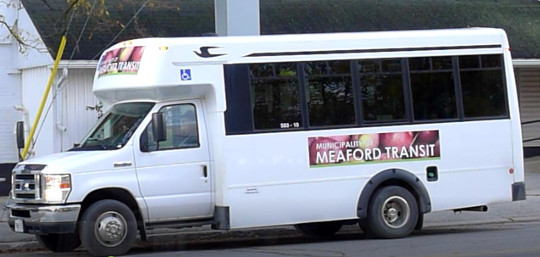Stephen Vance, Staff

Meaford’s municipal transit pilot project will be extended through 2018, and will include improved operating hours and the ability to purchase monthly passes.
At their October 16 meeting, Meaford councillors gave initial approval to seven staff recommendations, including the extension of the pilot project until December 31, 2018, a direction to staff to enter into a partnership agreement with Home and Community Support Services of Grey-Bruce for operation of the specialized transit service, the discontinuation of the municipally run bi-weekly shopping shuttle, shifting the operating hours for the municipal transit bus from mornings and afternoons to full day operation from 8 a.m. until 5 p.m., and the establishment of monthly passes at a cost of $40 for adults and $30 for students.
Council also approved a recommendation that staff negotiate a contract change order with First Student busing to offer weekend transit service from May 1 through October 15.
The municipality launched its public transit pilot project in October of last year with a 30 minute loop that offered riders the ability to travel to several areas, including the medical clinic and the grocery store, for a $4 fare. Over the past year the bus has operated on weekdays in the mornings from 8 a.m. until 10 a.m., and in the afternoons from 2:30 until 5 p.m. During the hours that the municipal transit route was not being serviced, the bus was used for its original purpose of transporting those with mobility and other health issues.
“The intention behind this dual use was to gauge service demand while also trying to better utilize the bus,” noted Meaford Treasurer Darcy Chapman in his report to council.
In response to public feedback, in March of this year council approved the reduction of the fare being charged from $4 to $2.
Chapman told council that sharing one vehicle to serve two separate service areas has hampered the ability to provide full day transit services, which has been a source of frustration for some users who could find themselves stranded without careful planning of their outing.
“The biggest issue that we’re facing is that we’re using one vehicle to do two different things,” Chapman told council. “Our ridership on the conventional transit is reflective of the fact that we have a very broken up system, and it’s not contiguous throughout the day.”
Thanks to a healthy balance in the gas tax reserve fund of nearly half a million dollars, built on funding provided by the province which can only be used for public transportation expenses, the municipality could continue to experiment with municipal transit options for several years without any cost to Meaford’s ratepayers.
“There certainly is an ability for us to use more gas tax funds than we’re using right now. The majority of the gas tax funds that we get every year go into the reserve fund,” Chapman told council. “Ultimately this plan would allow us to run both the specialized service, and the Monday to Friday conventional service, and keep dipping into the gas tax on an annual basis to offset those costs, and we’d get six to eight years without any impact to the taxpayer.”
Chapman said that a partnership with Home and Community Support Services of Grey-Bruce could enhance both the specialized transit and conventional transit services.
“In May 2017, the Municipality was approached by Home & Community Support Services of Grey-Bruce (HCSS) seeking clarification on the Municipality’s specialized transit system to determine if there were potential opportunities for shared services in order to prevent duplication of services in the community. Currently, HCSS has 76 active members on their eligibility list that reside in the Municipality,” noted Chapman in his report to council. “One area of a duplication of service is the Owen Sound Shopping Shuttle. As there are only few users on the specialized transit eligibility list that use the Shopping Shuttle, staff are recommending the discontinuation of the service by the Municipality, and propose to offer this service to eligible members through HCSS. Currently, HCSS has a vehicle that makes a stop at the Meaford Hospital on Tuesday mornings as part of the Day Away program. The bus is then required to “deadhead” back to Owen Sound and then return to Meaford later in the afternoon. There is an opportunity for the existing HCSS vehicle to be utilized in the transportation of users that wish to go to Owen Sound and will allow for the service to be offered on a weekly basis, rather than the twice a month basis that is currently offered.”
Under an agreement with HCSS, the municipality would be responsible for the provision of the vehicle to be used for specialized transit services, and HCSS would be responsible for operation of the service.
During the year-long pilot project for the conventional transit service, Chapman said in his report that ridership was lower than desired, but not unexpected due to the hours of service.
“The ridership for the one-year period of the transit pilot program where fees were charged was 1,494 riders. This generates a forecasted trip per revenue hour ratio of 1.28 trips per hour that the bus is in service. Based on the Canadian Urban Transit Association, the reporting agency for tracking transit statistics in Ontario, the average trip per revenue hour ratio for similar-sized conventional transit programs is the 3-7 trips per hour, placing the Municipality well below the average performance target,” noted Chapman in his report. “Based on the feedback received by staff, for reasons other than the routing, people are generally confused by the split between the specialized and conventional transit systems or the reasoning behind the Municipality providing conventional transit. Some of the feedback is that people still feel the bus is for specialized transit only.”
By handing over the specialized transit services to the HCSS, the municipality would be able to provide a more consistent conventional bus service.
“With the proposed specialized transit partnership with HCSS, the Municipality would be able to increase the conventional transit program hours of operation from four hours per day to eight hours per day and eliminate the service disruption in the middle of each day. Using the current rides per hour, the forecasted ridership would increase to approximately 2,621 per year or approximately 40% of similar sized programs,” noted Chapman in his report.
Members of council unanimously supported the plan, and they encouraged staff to increase the promotion and education about the transit service.
“I’m in favour of giving it another year and to see with those changes how much more both buses could be utilized,” said Councillor Shirley Keaveney. “Like everything it’s all about education, so how can we get behind this and really promote useage of the bus? Can we get a solid campaign going to encourage ridership?”
Chapman told council that the municipality will significantly increase its promotion and education regarding the transit system.
“I think that’s going to be our biggest task over the next few months,” Chapman told council.











